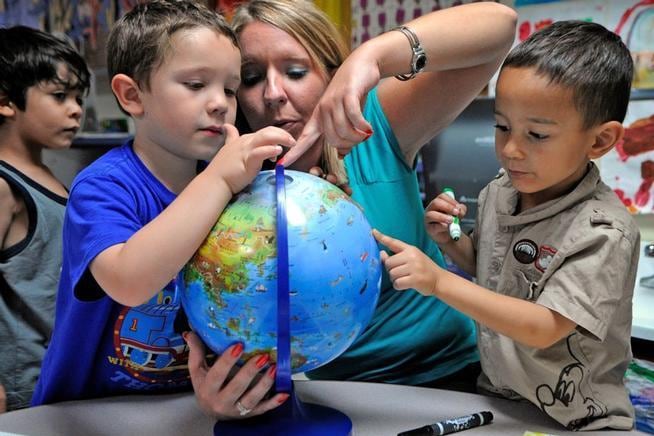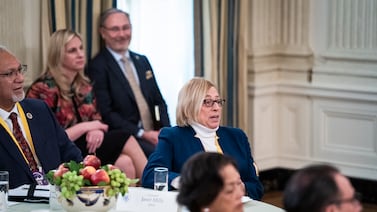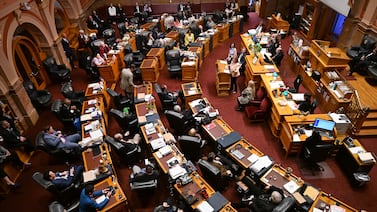To get better readers, elementary schools should spend more time on social studies.
That’s one recommendation from a new study that looked at whether more time spent on various elementary school subjects was linked to improved reading ability. Social studies, the authors found, was the only one where extra time made a clear difference.
The study, published Thursday by the conservative-leaning Thomas B. Fordham Institute, pushes for a greater emphasis on building elementary students’ knowledge of history, civics, and geography. It also argues against the popular notion that young children first learn to read and then read to learn — asserting, as some researchers have for decades, that children can do both at the same time.
“We’ve been arguing about how to fix reading in our country’s schools for many decades,” said Adam Tyner, one of the study’s authors. “The report is important because it gets at one of the major reasons why we continue to have these lagging results.”
Only about one-third of American fourth-graders and eighth-graders can read proficiently, according to the National Assessment of Educational Progress, a test often referred to as the “Nation’s Report Card.” Those rates have inched up modestly over the last three decades. (The benchmark for “proficiency” on the test is generally considered a high bar.)
The Fordham study, based on a sample from a federal data set of 18,000 kindergarteners who were followed through fifth grade, found that students who received an additional 30 minutes of daily social studies instruction in first through fifth grade scored higher on reading exams by the end of fifth grade.
Tyner called it “a modest, but sustained effect over a five-year period.”
The study controlled for other factors, like poverty and prior test scores, that may have affected student learning, although the authors acknowledge that their approach cannot definitively show that more social studies causes better reading scores.
The apparent benefits of extra social studies were most pronounced for students from lower-income families, those from non-English speaking households, and girls, the study found. Students in the three lowest income quartiles — in other words, middle class and low-income children — all showed improved reading ability with additional time spent on social studies.
That finding means more social studies could help close academic achievement gaps, Tyner said.
So why does social studies instruction help kids read better?
Tyner and his co-author say it helps students build knowledge and vocabulary that are broadly applicable to other topics.
“Social studies can help students understand history, current events, family and social relationships, and common narratives; whereas, reading passages that putatively cover other subjects, such as literature or drama, may assume the reader already has a grasp of such knowledge,” they write.
Tyner said shifting some instructional time from language arts to social studies is practical because there’s a lot of time to work with. Elementary schools devote two hours a day to language arts instruction on average, compared with 30 minutes for science and 28 minutes for social studies, the study found.
“You can be improving literacy without working on literacy directly,” he said.
Nell Duke, a professor of education at the University of Michigan, said the study highlights how both science and social studies are neglected in the early grades. Although the Fordham study didn’t show an association between science instruction and improved reading ability, other studies have demonstrated such links, she said.
Duke agreed with the recommendation that social studies should get more time in schools, but disagreed with the study’s suggestion that teaching children reading comprehension skills and strategies comes at the expense of knowledge-building. Research shows the both are important ingredients in reading instruction, she said.
Duke was also cautious about a secondary recommendation in the study that schools consider adopting English language arts curriculum that contains more science and social studies topics than traditional literacy curriculums.
She said such curriculums — Core Knowledge Language Arts or EL Education, for example — shouldn’t be substituted for social studies and science lessons created by the field’s experts. In part, that’s because they may skip over grade-level standards or whole disciplines within the two subjects.
“My position is that what educators should be doing is reworking the daily schedule to afford more time for science and social studies,” she said.
That can be done by analyzing each minute of the language arts block to ensure it’s being used efficiently and effectively. But, she added, it’s work that should fall to administrators, not individual teachers.
The third and last recommendation in the Fordham study is to revamp reading tests so they align with the actual content taught in elementary schools, instead of focusing on abstract reading skills. The authors praise Louisiana’s effort to pilot a reading assessment that matches with the state’s social studies curriculum in a few school districts and charter networks.
“If fruitful,” they write, “such an approach could have much broader impacts for literacy across the nation.”







